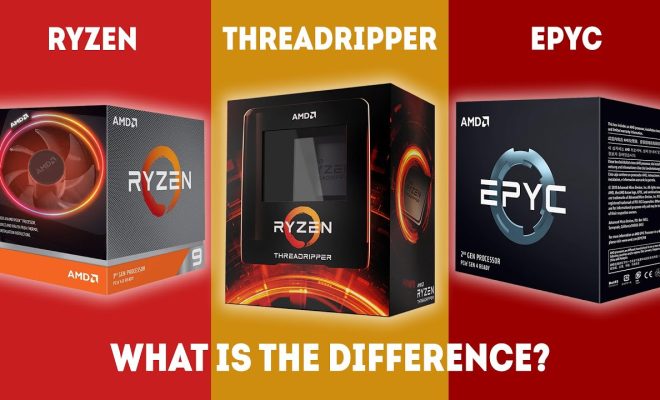AMD Threadripper vs. Threadripper Pro vs. Epyc: What’s the Difference?

When it comes to high-performance computing, AMD has established itself as a major player with its Threadripper and Epyc processors. With the recent launch of the Threadripper Pro series, users now have even more options to choose from. But what are the differences between these three processor families, and which one is right for your needs?
Threadripper: Powerful and Versatile
Threadripper processors are designed for desktop use, typically in high-end gaming or content creation systems. They offer a high core count (up to 64 on the latest Threadripper 3990X) and support for the PCIe 4.0 interface, which allows for faster data transfer speeds. Threadripper processors also have a higher base and boost clock speed than Epyc processors, making them ideal for applications that require single-core performance.
One area where Threadripper processors excel is in multithreaded applications, such as video rendering or scientific simulations. With their high core counts, these processors can tackle complex workloads more efficiently than most other consumer-level CPUs. Additionally, Threadripper processors support quad-channel memory, allowing for even faster memory bandwidth.
Threadripper Pro: Built for Workstations
The Threadripper Pro series was designed for professional workstations, offering enhancements such as increased memory support and additional PCIe lanes. Threadripper Pro processors can support up to 2TB of memory, which is more than triple the amount supported by standard Threadripper CPUs. Additionally, the Threadripper Pro series supports eight-channel memory, allowing for even faster memory bandwidth.
Another significant improvement in the Threadripper Pro series is the support for multiple GPUs. While the standard Threadripper series supports up to two GPUs, the Threadripper Pro series can support up to four, making it a powerful option for professionals who need to run multiple applications at once.
Epyc: Enterprise-Grade Performance
The Epyc processor family is designed for enterprise use, offering high core counts and massive amounts of memory support. Epyc processors have up to 64 cores per chip, and up to 128 PCIe 4.0 lanes for optimal data transfer speeds. They are also built to support multiple CPUs, allowing for even more processing power in a single system.
One of the significant advantages of Epyc processors is their support for high-speed memory, including up to 4TB of RAM. Epyc processors also support hardware-based encryption, ensuring that sensitive data is protected.
Which Processor Is Right for You?
Choosing between these powerful processor families ultimately depends on your needs. If you’re a gamer or content creator, the Threadripper series offers an unmatched combination of high core counts, fast clock speeds, and impressive memory throughput.
If you require even more processing power for professional applications, the Threadripper Pro series is a compelling option, adding support for increased memory, more PCIe lanes, and multiple GPUs. For enterprises that need the ultimate performance and memory capabilities, Epyc processors are the best choice, offering up to 64 cores per chip, massive memory support, and hardware-based encryption.
In summary, if you need optimal single-core performance, choose the Threadripper series. If you need ultimate multi-core performance, choose Threadripper Pro, and if you require enterprise-grade performance, Epyc is the best choice. Regardless of which processor family you choose, you can rest easy knowing that AMD continues to push the boundaries of processing power, giving users an unprecedented level of performance for their most demanding applications.




